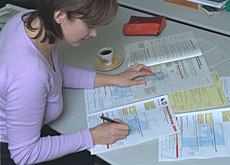Do Swiss taxpayers get a fair deal?

The Swiss Business Federation, economiesuisse, has given its support to the country's taxation system that has come under fire for allegedly favouring the rich.
A detailed study claims businesses and rich individuals shoulder nearly 60 per cent of the tax and social security burden, but critics say the calculations are misleading and unrealistic.
Taxation is one of the key issues as campaigning for the parliamentary elections in October heats up. The centre-right Radicals want a simplified tax scheme with the centre-left Social Democrats championing a fairer deal for people on low incomes.
Some cantons have attracted recent criticism for introducing tax breaks to lure big companies and rich foreigners. In June the Swiss Federal Court outlawed canton Obwalden’s degressive tax regime setting lower rates to wealthier residents, saying it was unconstitutional.
Switzerland is also embroiled in a dispute with the European Commission amidst claims that the cantonal corporate tax system treats foreign holding companies differently from home grown firms.
But the economiesuisse report, released on Monday, defends the “solidarity” of the current tax system. It calculates that 80 per cent of taxpayers, those on middle or low incomes, paid just over a third of the total tax and social insurance contributions in 2003.
“Our tax system is shaped by solidarity. No basis for social disintegration, that is thoughtlessly stated again and again, can be found in the figures,” said economiesuisse president Gerold Bührer. “They show a competitive, attractive tax system that benefits the economy and the population.”
Unrealistic picture
Thomas Daum, head of the Swiss Employers’ Association, added that companies already pay enough social insurance contributions and to increase the burden would damage Switzerland’s reputation as a place to set up business.
However, Professor Gebhard Kirchgässner, a tax expert at St Gallen University, said the report painted an unrealistic picture.
He believes that the comparative tax burden of low and high income earners has been distorted by ignoring selective figures.
“The study is not as informative as it purports to be. There are severe problems with the calculations,” he told swissinfo.
“By not taking into account capital gains tax and savings when calculating household expenditure it gives a biased picture of how much rich people are contributing to the value added tax.
“The share of the tax burden for the rich in relation to their income is also overestimated by not taking into account capital gains.”
Cover up
Kirchgässner also took issue with the way economiesuisse calculated the contribution of businesses by ignoring the fact that corporate taxes are actually paid by shareholders, customers and employees rather than companies.
The Social Democrats accused economiesuisse of covering up social inequality in its report.
“It suppresses that fact that the gap between the rich and the poor is growing. The true statement is hidden: that economiesuisse wants to undermine solidarity,” the party said in a statement.
swissinfo, Matthew Allen in Zurich
Individuals resident in Switzerland pay income tax at federal, cantonal and communal level. Each canton sets its own rates so the tax burden varies according to where the taxpayer lives.
A separate wealth tax on assets is set only at cantonal level. The annual wealth tax also varies, but is usually set at around 1.5%.
On January 1, 2001, all cantons had to bring their income and wealth taxes into line with the Federal Tax Harmonisation Act. This sets rules for what is considered to be income, and standardises deductions and allowances. However, it does not affect the sovereignty of cantons to set their own rates.
In December 2005, 86 per cent of Obwalden’s citizens voted in favour of the degressive tax system. It came into force on January 1, 2006, but was banned by the Swiss Federal Court in June this year.

In compliance with the JTI standards
More: SWI swissinfo.ch certified by the Journalism Trust Initiative



You can find an overview of ongoing debates with our journalists here . Please join us!
If you want to start a conversation about a topic raised in this article or want to report factual errors, email us at english@swissinfo.ch.